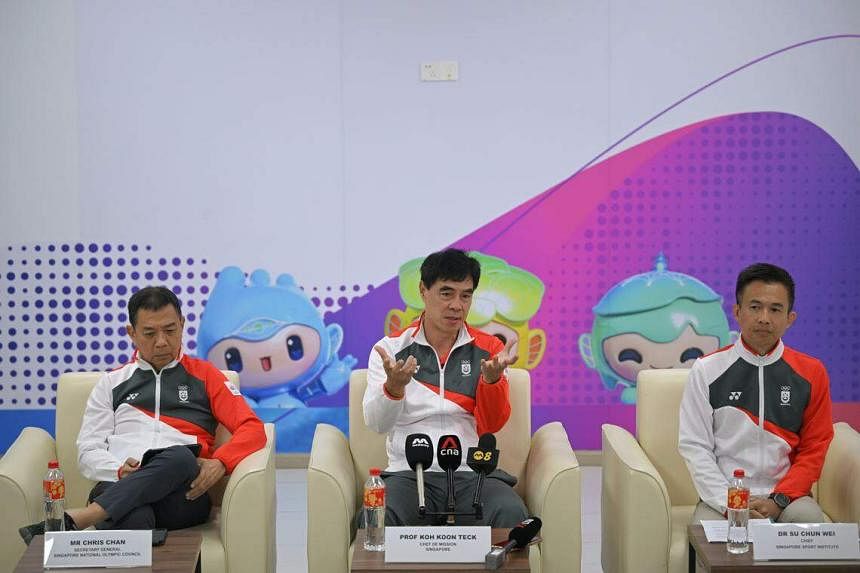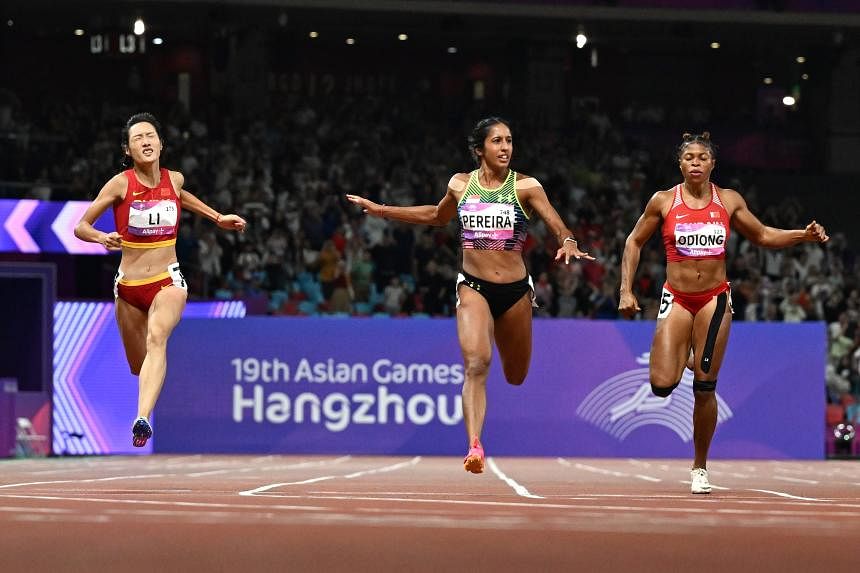HANGZHOU – Not since the 1998 Asian Games in Bangkok have Team Singapore returned home with fewer than four gold medals, but this time in Hangzhou, the Republic’s largest-ever contingent had a worst-ever haul of golds and overall medals this millennium.
Despite the dip in performance, top sports officials hailed the Hangzhou outing as a “successful” one with “significant wins” for Singapore’s athletes. However, they also acknowledged that other countries in the region have developed and improved more significantly than Singapore.
Of the 427-strong contingent, 334 were debutants and the athletes competed in 32 sports, with seven contributing medals.
Team Singapore won three golds, six silvers and seven bronzes in China to rank 20th out of 45 national Olympic committees as of press time – they were fifth in South-east Asia. At the 2018 edition, they claimed a haul of 22 medals (4-4-14).
Speaking at a press conference on Team Singapore’s performance at the Games, Singapore Sport Institute (SSI) chief Su Chun Wei said: “This, in my view, is a successful Asian Games for Team Singapore and we have continued to set new highs.
“Many of these performances we have witnessed here in Hangzhou have inspired the Singapore spirit and united Singaporeans.”
Among the highlight reels were standout performances in Olympic sports such as athletics, sailing, swimming and canoeing.
Paris-bound sprint queen Shanti Pereira delivered Singapore’s first track and field gold medal in 49 years when she won the women’s 200m final to add to her 100m silver. Fellow sprinter Marc Louis also bettered U.K. Shyam’s 22-year-old mark in the men’s 100m by 0.1sec after clocking 10.27sec in the semi-finals.
Over in Ningbo, the national sailors brought home the bulk of the medals with two golds, two silvers and three bronzes. World champion kitefoiler Maximilian Maeder won all the races in his event, while men’s ILCA 7 champion Ryan Lo earned Singapore an Olympic quota spot.
Swimmer Teong Tzen Wei also made waves with a men’s 50m butterfly silver to soothe the pain of 10 fourth-place finishes, as his teammates set five national records and 10 personal best timings, while in canoeing, kayaker Stephenie Chen won a historic silver in the women’s singles K1 500m.
Dr Su added: “Most of these medals were from Olympic events. This demonstrates that we have the ability, strength and depth of capability to win beyond SEA Games at the Asian and world level.”
Noting the exclusion of sports like bowling and pencak silat that contributed medals in 2018, Singapore National Olympic Council secretary-general Chris Chan said: “The standards at the Asian Games are exceptional. We have achieved some significant wins. Let’s build on this momentum to continue strengthening the sporting system and culture for Singapore as we prepare for the Paris 2024 Olympic Games.”
Elsewhere, there were also breakthroughs in wushu and xianqi. Jowen Lim won a first Asiad silver in the men’s daoshu and gunshu all-round event and Kimberly Ong also chipped in with a women’s changquan event bronze.
Ngo Lan Huong won the Republic’s first xiangqi medal with a bronze on Saturday.
The women’s and mixed bridge teams also contributed to the medal tally with two bronze medals.

But there were also disappointments, including heavy defeats in women’s football, rugby sevens, hockey and softball, and early exits in others.
Singling out fencing, table tennis, badminton, shooting and hockey, Dr Su noted that they have had success at the SEA Games but must “continue to improve to be successful at the Asian Games”.
He added: “Our competitors at the Asian level and beyond have improved faster, stronger and higher than ourselves. This is an important lesson for us to take back and reflect so that we can do better and train more intelligently against our competitors.”
Richard Gordon, SSI’s head of high performance and athlete life, shared that a detailed review of the Games will be conducted in the upcoming months with input from analysts, athletes, coaches and team managers.
He said: “I don’t think there’s a system issue... Some countries are accelerating faster and we’ve got to be able to resolve that.
“This is what happened in the pool. We had more than 30 finalists, far better than 2018, but the headline is we did not push through to the medals. There’s been a change in guard in the athletes with Joseph Schooling not with us... but maybe, we will be in a better position at the next Games three years away.
“Smaller nations tend to have this ebb and flow, while the larger nations, because they’ve got the volume, will tend to transit through.”
Team Singapore chef de mission Koh Koon Teck also thanked hosts China for their “top-notch” organisation, and the support team behind the athletes for making it an incident-free Games.
He said: “We have witnessed many heartfelt performances by our athletes. Everyone contributed to put in their utmost to work for one common goal – to make Singapore proud.”


